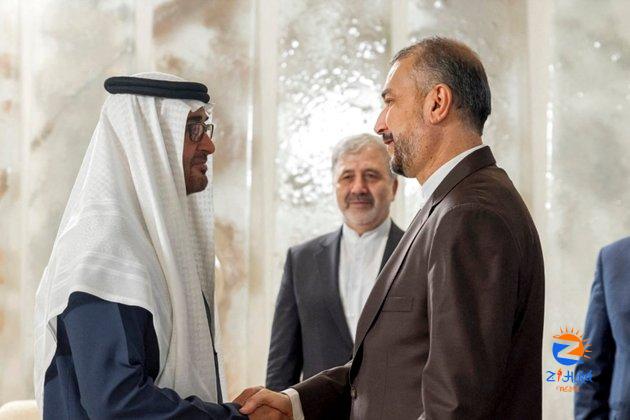
[ad_1]
DUBAI, UNITED ARAB EMIRATES – Iran’s foreign minister on Thursday concluded a three-day tour of Gulf Arab neighbors with a visit to the United Arab Emirates, where he held talks with the country’s president.
Hossein Amir-Abdollahian’s visit to the UAE followed stops in Qatar, Kuwait and Oman — the latest in a flurry of diplomatic moves by Tehran as it seeks to reduce its isolation, improve its economy and project strength.
On Thursday, he discussed ‘bilateral relations and ways to enhance cooperation’ in a meeting with UAE President Sheikh Mohammed bin Zayed Al Nahyan in Abu Dhabi, the official WAM news agency reported.
Amir-Abdollahian extended an invitation from President Ebrahim Raisi for Sheikh Mohammed to visit, Iran’s foreign ministry said.
He later met with his Emirati counterpart, Sheikh Abdullah bin Zayed, who emphasised ‘the significance of establishing an international approach to multilateral action based on cooperation and partnership,’ WAM said.
During the visit, Iran and the UAE also signed an agreement to expand air transport services between the two countries and increase trade and tourism opportunities, it added.
Gulf Arab countries are seeking to ease tensions with Iran, fueled in recent years by the conflicts in Yemen and Syria.
In a dramatic shift, China brokered an agreement between Iran and Saudi Arabia in March to restore ties after a years-long rupture.
Iran’s nuclear activities are also an issue of mutual concern, as Tehran seeks to revive a 2015 deal with major powers granting it sanctions relief in return for restrictions aimed at preventing it from acquiring a weapons capability — an ambition it has always denied.
Iran said last week it had been engaged in indirect negotiations with the United States through Oman, with nuclear issues, US sanctions and a possible prisoner swap on the agenda.
The following day, Iran’s top nuclear negotiator, Ali Bagheri Kani, said he had met with diplomats from three European countries in Abu Dhabi to discuss a number of issues, including his country’s nuclear activities.
In 2018, the United States under then-president Donald Trump unilaterally withdrew from the nuclear accord, prompting Iran to begin backing away from its own commitments a year later, including by stepping up its enrichment of uranium.
The administration of U.S. President Joe Biden launched talks to revive the deal in 2021, but the process has stalled amid on-off negotiations.
[ad_2]